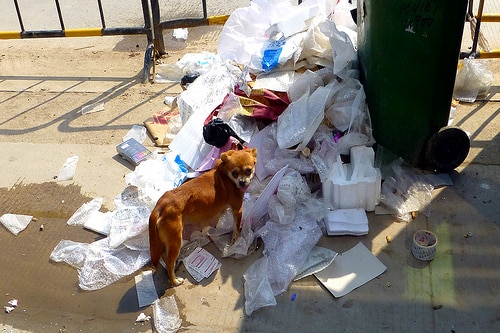One day, while riding the bus on my way to a small town in the interior of Hainan Island, I stood next to a lady busily consuming her dinner. She sat noisily slurping a plastic take out bowl container of soup noodles, obviously famished as it took her only 5 minutes to finish the bowl. Casually, she reached out from her open window, dumped the leftover liquid contents of the bowl out of the moving bus, and then let go of the plastic bowl and bag.
I couldn’t help myself; I stared, frozen in shock, as she picked up another plastic bag, this one containing a small Styrofoam box of fried noodles, and continued with her dinner. I quickly looked away, feeling myself becoming unreasonably furious, and searched for something else to focus on. My eyes settled on a faded sticker sign above the bus door that read: “Please do not throw trash from the bus”
China’s increasingly dire problem of waste and trash has been a hotly debated topic since Beijing started preparing to host the Olympics 10 years ago. At that time, Beijing’s leaders despaired that the average Chinese citizen did not possess the social norms which define a “civilized citizenry” and embarked on an extensive campaign to encourage Beijingers (and by extension the whole country) to adopt more “civilized” public behavior, including proper disposal of trash. Nowadays, but for more remote corners of the city, Beijing has become notably better about trash collection and disposal.
However, as you get further in China’s interior cities and smaller towns, the problem continues at a huge scale. On any given day, I pass two to three burning piles of trash, their acidic scent tainting Hainan’s ocean breezes. As I walk or bike down the street, I am careful not to tread on the trash dumped by the person in front of me. Gazing out at the ocean, I cringe at the thought of wading out to the water as half eaten corn cobs bob against my legs.
There are two dominant arguments in the discussion with regards to China’s trash problem. Some argue that Chinese people lack “素质” (“suzhi” or quality) and that the only way to address people’s bad habits are 1) wealth and 2) education. Another argument is that the government has not invested enough into waste disposal infrastructure, especially recycling capacity. Without proper alternatives, Chinese people resort to informal mechanisms such as illegal dumping or burning.
As is the case with all problems, China’s trash problem is a complicated issue involving aspects of both arguments. I always dislike anthropological arguments that imply some sort of ethnic deficiency in quality. China’s trash problem is not a “quality” issue, as I have encountered plenty examples of indigenous conservation and environmental consciousness. My grandfather to this day hoards plastic bags and is so reluctant to throw out trash bags unless they are full. Much to the consternation of my grandmother, this creates pest problems. Many households meticulously collect their plastic and paper waste to sell to the neighborhood 回收(recycler).
But there is no denying that as Chinese lifestyles change from traditional agrarian to modern urbanity, Chinese trash has also changed. Whereas once a person’s waste would be simple organic materials and the occasional worn out piece of furniture, now an average Chinese person generates 3.3 pounds of trash a day, much of it plastics, electronics, and other materials that are increasingly toxic and not biodegradable. Just as their waste has changed, Chinese people’s methods of waste disposal must change with it, but that sort of consciousness and behavior change takes time, education, and sufficient public investment into infrastructure.
China is drowning in modernity’s trash, and its up to this “modern” China to do something about it.


